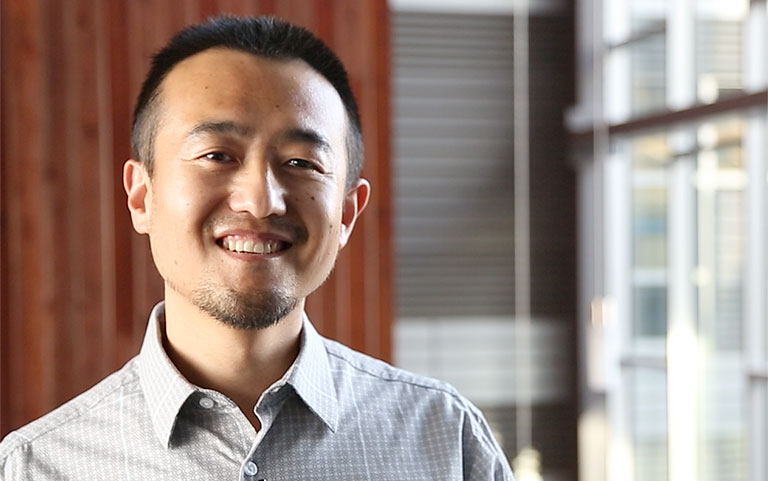Q&A with Y.C. Zhang - Bringing Talent and Passion to Power Systems

Dr. Yingchen (Y.C.) Zhang was recently appointed manager of the Sensing and Predictive Analytics Group in NREL’s Power Systems Engineering Center. His conviction in interdisciplinary science and his broad expertise in power systems will help lead research efforts at NREL in modeling and forecasting renewable resources and grid conditions. Zhang has authored more than 60 peer-reviewed publications, and he holds a patent in the design of a phasor measurement unit (PMU), following in the footsteps of his alma mater, Virginia Tech, where the first PMUs were built. We talked with Zhang about his research—past, present, and moving forward. The following conversation has been edited for length.
While a student of electrical engineering, were you interested in renewable energy technology?
While I was in graduate school, conventional power systems were the main research focus; however, the smart grid concept had just started, and a lot of new monitoring control devices were being invented and added to the mix of power system assets, so our research was on how to better use those new technologies to improve the electric power system.
But working on renewables really started when I joined the California Independent System Operator. They started to see rapid growth in renewables, especially wind, both from within their territory and from neighboring states, and that brought many challenges. By the time I joined NREL, my research focused on renewable integration of power systems.
How has your research changed since coming to NREL?
My research now is broad. I study how to best use large amounts of data to better analyze, predict, and control power system conditions. For example, my past research involved synchrophasors, which are one type of metering system. Nowadays, many more devices can monitor and send grid information to system operators. Households have smart meters and other devices—the Internet of Things—that can monitor individual energy consumption and energy conditions, and that info can be used to help optimize electric power systems operations. In addition, systems are available that haven’t been used in power systems operations yet. For example, weather conditions give you a good indication of renewables production and future load conditions. If all the info is being used correctly, it will give operators a better understanding of what’s happening now and a better ability to predict energy production and use in the future. Because of developments on the computer science side, especially in machine learning, the ability to process big data gives us more tools to analyze and make predictions.
What is the most urgent work needed in the Sensing and Predictive Analytics Group?
What’s already happening within my group and in the broader research community is the invention of useful methods for using big data in power systems applications. Big data science is an exciting area, but currently it’s more focused on consumer behaviors, such as how Amazon and Google target consumer actions. Tailoring it to power systems applications is difficult. The power system is one of the most complex, man-made systems that touches a variety of different domains. Inventing methods based on the current data science technology is the most critical task we’re now tackling.
Researchers in my group have a mix of talent and experience from different domains. We have people who have backgrounds in meteorology and understand how to use weather models. We have people who focus on machine learning and optimization, and who have developed several data analytics methods. And we have people who understand which data are available from the power systems side. Because of the mix of talents, we’re able to bring these methods together to work toward energy systems applications.
What do you consider your most important research projects?
There are many! When I joined NREL in 2012, coming from the utility industry, I realized that in the research community we have many good tools and methods that are published in research papers, but they don’t always transition to improve systems operations. One theme I try to instill in our research is that as we invent advanced data analytics tools, we should focus on how to make the output much easier and standardized toward systems operations. I think that’s one of our biggest achievements so far—pushing the acceptance of advanced technologies—and I’m glad to see that this thought process has been accepted by sponsors and utility partners.
The other is that I aspire to bring an interdisciplinary approach to projects and to build an interdisciplinary research team. My philosophy is that if everyone is bringing a different research specialty, and if we set a target upon which everyone agrees, then we can achieve more than we ever could alone.
Learn more about NREL's work in sensing and predictive analytics.
Last Updated May 28, 2025
